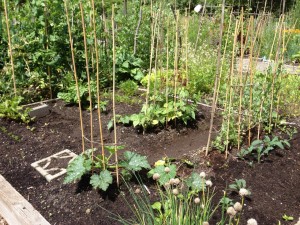No wifi here in the community garden – none that I can access anyhow – so I will post this later from the Common’s Block. 8:37 am July 3rd at the Acadia Community Garden, sky overcast and cool breeze – my kind of summer. Plants could be watered, but maybe later this evening, as my wife knows more about what needs more water. She planted everything excepts the uneven beets and carrots – wonder which of the few remaining species we have got growing in our ground. Of course, everything has to be organic, but looking around in other plots, with giant zucchini and other “food of the gods” not sure how much air-quotes go around these organic soils. Guy at Rona – with the frog-killing parking lot – told us they have to be certified, but of course air-quotes will soon be popping up around certified too. Masanobu Fukuoka plays on this theme throughout his One Straw Revolution, and good for him: he worked his way into and out of the argi-science business and survived the war that almost ended up killing nature (fears that plant life would not come back around Hiroshima, close enough to his ancestral Matsuyama home).
It is hilarious that Fukuoka calls himself and “old crow” (p. 19) considering the dramatic import this trickster has in Ruth Ozeki’s novel A Tale for the Time Being. Her husband Oliver Kellhammer probably read aloud the One Straw Rev while she was reading to him Sei Shōnagon – what an intriguing dinner party they must host! The seed bombs we are going to make, as per Fukuoka’s instructions later today must have been modified by Oliver to recreate his primordial forest EVEN THOUGH the publishers of OSR saw fit to include the disclaimer “may not work in the United States” while rather clumsily apologizing for Fukuoka writing so Asianey. Those quick throwaway comments about the uselessness of music education, or education and medicine in general, are really the heart of he revolution, not that people can finally grow things faster better stronger by hacking into nature’s plan.
A Tale for the Time Being by Ruth Ozeki
My rating: 5 of 5 starsThis may the first instance of quantum literacy, or not, for it considers possible actions an author, an environmentalist, a diarist, a computer programmer, a textbook publisher, a Buddhist nun, a kamikaze pilot, a French philosopher, a Japanese hostess, a beach-combing former anthropologist etc. etc. do and do not. The action of reading, pacing oneself by chapters and keeping up with the narrative now, changes the purpose of writing. All the above mentioned characters are one, or any combination of people living, dying or getting caught in between. Read at any other time in my life, the book would be somewhat different, but finishing it just before my summer semester begins will doubtlessly change the entanglement of ideas towards my thesis. If only I could crack the superposition code, or crow, so that I could be professoring in Japan while authoring on the west coast of Canada, I will have achieved the best possible world. Very inspired by Ruth’s example.
View all my comments
“Why is it impossible to know nature? That which is conceived to be nature is only the idea of nature arising in each persons mind. The ones who see true nature are infants” (pp. 25-26) – he really could have gone with the fish-seeing-water metaphor, but I am glad he stuck with children’s natural insight. In a couple a weeks and a few plots over from our hatake, Acadia children will be coming to tend to their plot. As their community assistant, I plan to reveal so of the unknowable part of gardening, perhaps letting the weeds stay where they are and clay bombing. Still have to find out how much work goes into the “do nothing” farming Fukuoka suggests, but it won’t be too hard to get my wife on-board. Not only was the city Fukuoka first stop on our honeymoon, but she has so many interesting connections to this revolution asides from, you know, being Japanese. Her father worked for his prefectural office studying cattle (cloned Angus he one explained, just like Kobe beef but more unnatural?). Her hometown hatake owns is about the size of a modest house, and since she has no plan to return or develop it, a garden it will remain. Lastly, her brother was recently transferred to Matsuyama, where his family is not thriving at all. Perhaps if he got into farming instead of construction (developing the city more and more into ancient farmland) things will get better. A pipe dream for sure, but so is the OSR according to the many specialists. Have poets and artists started flocking to the Old Crow’s farm?

